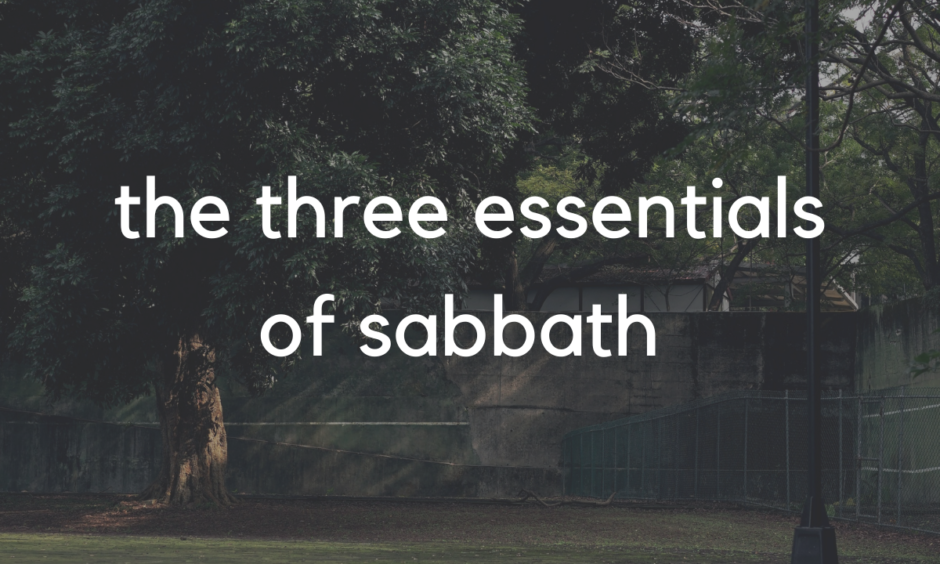One of the most foundational rhythms of creation is Sabbath. In the biblical narrative God works for six days to create the world and, on the seventh, rests for the entire day. The writer of Genesis wants to make sure we get the significance of this rest. He tells us that God finished his work and rested (Genesis 2:2) and then emphasizes the importance by stating that, as a result of this resting, “God blessed the seventh day and made it holy, because on it God rested from all his work…” (2:3).
Perhaps the most amazing part of this story is that this day of rest is also humanity’s first day of existence. On day six God creates Adam and Eve and gives them the monumental command to be fruitful, multiply, fill the earth, and subdue it. There was morning and there was evening, the sixth day. The following day – the seventh – God and his creation rests.
This story sets in place a principle that weaves its way throughout the rest of the scriptures: human activity is intended to begin from a place of rest in and with God.
Beginning from rest is a practical way of beginning from faith and trust – starting with an acknowledgement of our finite power and total dependence upon our creator before we go out and begin to act upon his commands.
Start with Sabbath
Biblically the foundation of this resting is the rhythm of Sabbath demonstrated by God and repeatedly commanded for the Israelites throughout the old testament. Over and over again God admonishes them of the importance of honoring this day set apart to God.
One of the best things that you can do for your soul, for your family, and for your ministry is to make Sabbath an integral part of your life. A day of rest is also one of the most counter-cultural things we can do in a world that insists that our value is in externals and in things other than God.
In a world that insists that your productivity defines your identity, Sabbath declares that God is the one who defines things.
In a world that insists that we can do or be whoever or whatever we want, Sabbath declares that we are dependent, created beings who must submit to a generous and kind creator.
In a world that insists that we can consume our way into satisfaction, Sabbath declares that – as Jesus says – man actually lives by every word that comes from the mouth of God.
How to Sabbath
Jesus is intentionally confrontational with the Jewish leaders of his day and their ferocious legalism surrounding the practice of Sabbath. He intentionally heals a man with a withered hand, knowing it goes against religious rules of the day, making the declaration that, “Sabbath was made for man, not man for the sabbath.”
So, how do we Sabbath? Is it a day for locking yourself in your room and studying the Bible all day? It doesn’t seem so. There’s not space in this article to delve into all that Scripture has to say on Sabbath. Others have done that far better than I can. But in light of Jesus’ declaration that Sabbath was intended as a gift for humanity and the fact that God set it apart as a holy day by resting from his work, I believe that there are at least three essentials to shaping a biblical day of Sabbath.
The three essentials
A quick acknowledgement – these three essentials are a slightly modified and expanded version of what was shared by Sarah Deustcher at the Rebuilders conference in 2017. Her message – which speaks far more broadly than the topic of Sabbath – is well worth listening to.
1. Reverence
The Sabbath is a holy day – a day set apart from the rest of the week, which means that to practice sabbath you must somehow make this day (whichever day of the week it is) somehow distinct from the other six.
On your sabbath you change how you use your time in ways that declare it is holy. Both in your mind and in tangible ways, Sabbath must be set apart with reverence.
Reverence might look like:
- Instead of hopping out of bed right away to get stuff done, lay in bed and thanking God for the good things he’s put in your life.
- Listen to music that’s different from your normal – or maybe not listening to music at all!
- Taking an unhurried walk in nature, reveling in God’s creativity.
- Setting aside an extended time for prayer
2.Rest
Part of what Genesis 2 says that makes the Sabbath holy is that it’s a day of resting from work.
One of our biggest weapons against the enemy’s and the world’s pressure to ground our identity about what we do rather than who we are in Christ is the practice of rest. This means that Sabbath must be a day where you intentionally don’t do labor.
However, this doesn’t mean it’s a day sitting around doing nothing or binging entertainment. It’s meant to be a day of finding your soul’s rest in God’s good gifts.
A helpful guide to discover what this rest might look like is to ask yourself the question – what does my soul need today? Depending on your personality, the current circumstances of your life, and other factors, sabbath may look significantly different for you than it does for your friends. It may also look different for you now than it will three years from now.
Whatever it is, rest means doing whatever it is that fills your soul and brings you into the gratitude-inspiring pleasure of God.
Rest might look like:
- Taking an hour or two to sit at a coffee shop and read
- A movie marathon with friends
- A lazy morning in your pajamas, playing with the kids and totally ignoring your mental to-do list.
- Turning on worship music and organizing your garage
- Spending the day at the beach without looking at your phone
- Getting takeout rather than cooking dinner
3.Resistance
The final essential of sabbath is resistance; an intentional withdrawing from anything that culture says to you, “You need to be this” to have a sense of identity or purpose. Depending on your context and culture this will probably mean saying no to things like getting “work” done (as in the previous point), social media, consumerism, and perhaps even more subtle things like needing the last word or demanding to have your rights acknowledged.
This resistance may manifest itself in hundreds of ways. The key here is simply – as already stated – the intentional withdrawing from anything that demands it shape your identity. Even if it’s something that’s good.
Resistance might look like…
- Turning off your phone for the day
- Not going shopping
- Setting aside your normal Bible reading and instead simply enjoying quiet in God’s presence
- Having a long phone conversation with your spouse about where you’re struggling
- Doing something to bless someone who has hurt or offended you
- Reading a novel that will open your eyes to a significantly different perspective
Integrating the three
As your beginning to practice Sabbath, use these three – reverence, rest, and resistance – as lenses to shape your Sabbath days.
The point of this isn’t perfection – it’s practice. It may take several weeks or even months to find a balance, but if you’re doing it right you’ll begin to find the Sabbath day is a delight and that you end your Sabbaths generally overflowing with gratitude for God’s kindness to you. And, as you do so, the people around you will probably begin to notice the change in you.





No Comments